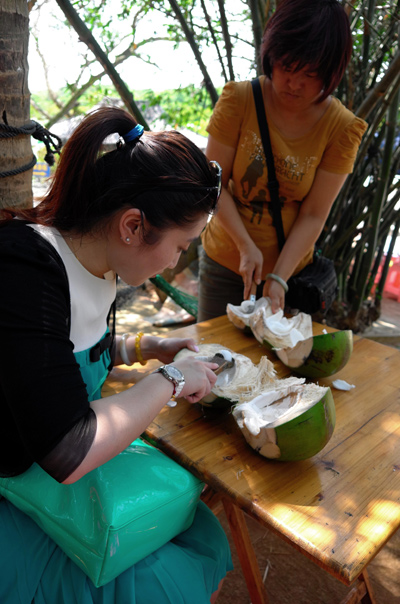Taking a leaf out of the book of nature
By Peng Yining and Huang Yiming (China Daily) Updated: 2014-06-16 08:05
|
 Selling coconuts brings a stable income for local villagers, who used to rely on fi shing and shrimp farming. [Photo by Huang Yimin / China Daily] |
The park also changed Huang Ye's life, but in a good way. The former shrimp farmer decided to dive headfirst into the tourism industry, selling coconuts to visitors. During peak season, the 42-year-old sells more than 100 coconuts a day for 6 yuan each. The work is not only lucrative, but also stable. "The shrimp industry is full of risks. You could earn more than 100,000 yuan a year, but you also could end up with nothing if the market wasn't good," he said. "More than 100 people in my village regularly come to the park to sell food. Our incomes are lower than before but more stable, and selling coconuts is much easier work than fishing or shrimp farming."
Shi Nanfang, 40, also sells food - salted eggs - to tourists, earning 2,000 to 3,000 yuan a month. "I hope more tourists will come here. Visitor numbers are too low now because the park hasn't been fully developed and lacks support facilities, such as shopping malls and restaurants," Shi said. "The greater the number of visitors, the more money I make."
Li Zhicheng, a 48-year-old visitor from the northeastern province of Heilongjiang, said Hainan is one of China's most popular tourist spots, and the mangrove forest is a perfect stopover during a trip to the island.
"It's only during the past decade that Chinese people have had enough money for travel, so we are eager to go out and find nice places away from the cities and the pollution," Li said. "It would be a shame if the park wasn't open to the public. Dongzhaigang is both beautiful and educational. I didn't know anything about mangrove forests before, but now I understand how important it is to protect the coastline."
Deng Xiaogang, the deputy mayor of the provincial capital, Haikou, said the local administration is trying to strike a balance between protection and development. In 2013, the city's natural beauty resulted in it being rated as China's happiest city by Central China Television, and it was ranked third - after Zhuhai in Guangdong province and Hong Kong - out of 289 cities, in a list of China's "most livable" cities.
Deng said the mangrove forest, which is "like a lung to the city", contributed to those awards. He feels that it's essential to open the place to the public. "Tourism is the pillar industry in Haikou. The premier's visit provided a huge amount of publicity for the Dongzhaigang reserve," he said. "We can protect the forest while still opening it to the public."
According to Deng, less than 10 percent of the reserve is open, and the rest is devoted to plant cultivation and scientific research, but the main purpose of the park is educational, and visitor numbers have to be strictly controlled.
In the 1990s, a lack of protection resulted in damage to half of Hainan's mangrove forests. People living along the coast cut the trees to make catching crabs and fish easier, and wastewater from nearby pigpens also had a devastating impact on the local environment.
"The coastal area was a big dumping place back in the 1990s. The water was black," said a member of the reserve's staff. "Now, the forested area has doubled in size and the water is blue again."




